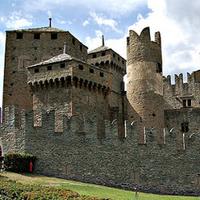2. Cosa si custodiva in una fortezza
|man|bewahrte|||
thing||it was kept|||
2. Was in einer Festung aufbewahrt wurde
2. What was kept in a fortress
2. Lo que se guardaba en una fortaleza
2. Ce qui était gardé dans une forteresse
2. Wat werd bewaard in een fort
2. Co było trzymane w fortecy
2. O que era guardado numa fortaleza
2. Vad som förvarades i en fästning
2. Bir kalede tutulan şey
Nella fortezza si custodivano le persone più importanti ed i loro averi.
|||wurden bewahrt|||wichtigen|wichtigen||||Besitz
|||they kept||||||||possessions
Die wichtigsten Personen und ihr Hab und Gut wurden in der Festung aufbewahrt.
The most important people and their belongings were guarded in the fortress.
W twierdzy przetrzymywano najważniejsze osoby i ich dobytek.
Questo perché la fortezza era il posto più sicuro, in quanto proteggeva dai nemici e dal brutto tempo.
|||Festung|||Ort||||da|schützte|von den|Feinden|||schlechten|Wetter
this|because||||||more|safe|||it protected|from the||||bad|
Dies liegt daran, dass die Festung der sicherste Ort war, da sie vor Feinden und schlechtem Wetter schützte.
This was because the fortress was the safest place, as it protected from enemies and bad weather.
To dlatego, że forteca była najbezpieczniejszym miejscem, ponieważ chroniła przed wrogami i złą pogodą.
Nella fortezza non vivevano solo i signori del castello con la loro famiglia ma anche i loro domestici ed i cavalieri.
||||||Herren|||||ihre||||||Hausangestellten|||Ritter
|||||||||||||||||servants|||knights
In der Festung lebten nicht nur die Burgherren mit ihrer Familie, sondern auch ihre Diener und Ritter.
In the fortress lived not only the lords of the castle with their family but also their servants and knights.
W twierdzy mieszkali nie tylko panowie zamku wraz z rodziną, ale także ich słudzy i rycerze.
Questi includevano uomini armati, paggi, proprietari terrieri, damigelle ed un prete.
|einschlossen|Männer||Burschen|Eigentümer|von Ländereien|Damen|||Priester
|they included|men||pages|owners|landowners|maids|||priest
These included armed men, pages, landowners, damsels and a priest.
Byli wśród nich bandyci, paziowie, właściciele ziemscy, druhny i ksiądz.
Con la crescita dei castelli, i signori avevano camere più belle costruite nei cortili.
Mit|der|Wachstum||Burgen|||hatten|||||in den|Höfen
||growth||||||rooms||beautiful|built||courtyards
Mit dem Wachstum der Burgen ließen die Herren in den Höfen schönere Räume bauen.
With the growth of castles, the lords had more beautiful rooms built in the courtyards.
Wraz z rozwojem zamków panowie budowali na dziedzińcach piękniejsze pomieszczenia.
I nemici ricchi spesso non erano tenuti prigionieri nelle celle sotterranee, ma erano loro assegnate stanze confortevoli nel castello ed i loro amici avrebbero quindi pagato per liberarli.
||reiche|oft|||gehalten|prisoners||Zellen|unterirdischen||||zugewiesen||komfortable|||||||würden|also|||sie zu befreien
||rich|often|||held|prisoners||cells|underground||||assigned|rooms|comfortable|||||||they would|therefore|paid||to free them
Wohlhabende Feinde wurden oft nicht in den Kerkern gefangen gehalten, sondern bekamen komfortable Zimmer in der Burg und ihre Freunde zahlten dann, um sie zu befreien.
Rich enemies were often not kept prisoners in the underground cells, but they were assigned comfortable rooms in the castle and their friends would then be paid to free them.
Zamożni wrogowie często nie byli więzieni w lochach, ale otrzymywali wygodne pokoje w zamku, a ich przyjaciele płacili za ich uwolnienie.
Per quanto riguarda il dormire, i ricchi avevano letti confortevoli con delle tende attorno ad essi.
was|was|es betrifft||Schlafen|||||||einigen|Vorhänge|um sie herum|an|ihnen
for||regarding||||||beds|comfortable|||curtains|around||
As for sleeping, the rich had comfortable beds with curtains around them.
I domestici erano meno fortunati: dovevano portar fuori i loro materassi fatti di paglia e dormire dove potevano; spesso si trattava dell'ingresso principale.
|servants|||unfortunate|they had to|to carry|outside|||mattresses|made||straw||||they could|often||it concerned|of the entrance|main
The servants were less fortunate: they had to take out their mattresses made of straw and sleep where they could; often it was the main entrance.
Nei castelli non esistevano toilette ma qualcosa di simile.
|||they existed|toilets||||
There were no toilets in the castles but something similar.
C'erano dei vasi nelle camere da letto dei signori ed i domestici dovevano svuotarli.
||Vasen|||||der|||||mussten|sie leeren
||vases|||||||||||empty them
There were pots in the lords' bedrooms and the servants had to empty them.
C'erano anche dei canali di scarico che si trovavano nei muri esterni della fortezza.
|||||ablauf||||||||
|||channels||drainage|||they found||walls|external||
There were also drainage canals that were in the outer walls of the fortress.
Si può immaginare dove tutti gli escrementi potessero finire e quali problemi abbiano provocato.
||vorstellen|||||könnten|landen|||||
|you can|||||excrements|they could|||||they have|they caused
One can imagine where all the excrement could end and what problems they caused.
Quanto ai bagni, vi erano delle tinozze simili a dei barili.
|||es gibt|||Wannen||||Fässer
||bathrooms|in them|||tubs||||barrels
As for the bathrooms, there were tubs similar to barrels.
Alcune di queste erano così grandi che le persone avevano bisogno di scalette per entrarvi.
||||||||||Bedarf||Treppe||hineinzugehen
|||they were||||||they had|need||little stairs||to enter there
Some of these were so large that people needed stairs to enter.
Nemmeno i nobili si facevano il bagno così spesso.
not even||||they made|||so|often
Nobles didn't even bathe so often.
Nawet szlachta nie kąpała się tak często.
Le tinozze venivano portate nelle loro camere da letto su loro richiesta ed i domestici trasportavano secchi di acqua calda dalle cucine alle stanze dei signori.
|tubs||carried||||||||||||they transported|buckets|||hot||kitchens||||
The tubs were brought to their bedrooms at their request and the servants carried buckets of hot water from the kitchens to the lords' rooms.
Le cucine erano piene di domestici che preparavano i pasti; non vi erano frigoriferi o freezer, così per poterlo conservare fresco, il cibo doveva essere tenuto nelle stanze più fredde del castello.
|kitchens||full||||they prepared||meals||||refrigerators||freezers||for|to be able to||fresh|||||kept||rooms|more|cold||
The kitchens were full of servants preparing meals; there were no refrigerators or freezers, so in order to keep it fresh, the food had to be kept in the colder rooms of the castle.

